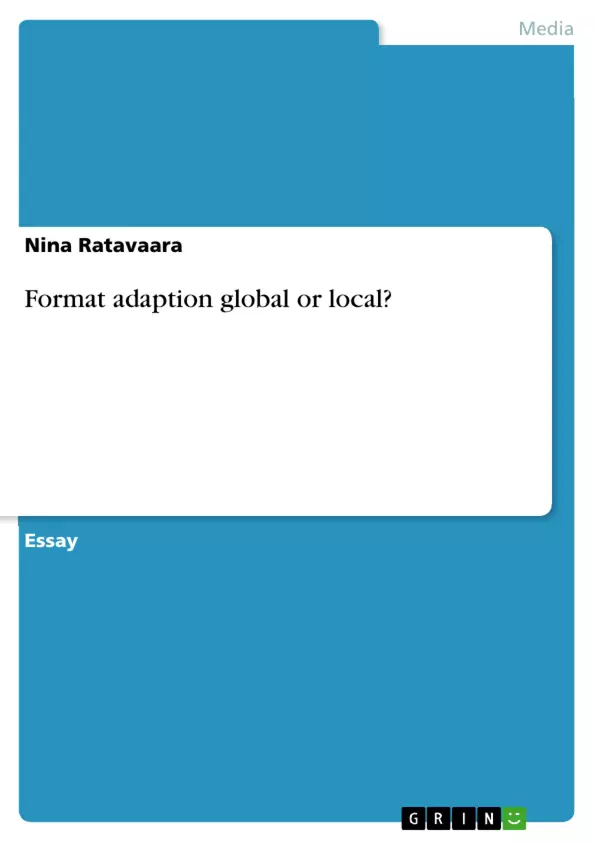This essay addresses the topic of format adaption. The definition of a format, the development history as well as the role of format adaption in the global and local media landscape will be examined. The main focus will lay on the question if and how format adaption has influenced the media world and why formats are so successful. These questions will be linked to the cultural imperialism and globalisation discourse. The theoretical construct will be complemented by the example of Big Brother to clarify the most important aspects of the argumentation. A discussion of this topic is valuable because the arguments raised in the positioning of format adaption reflect the general point in the media imperialism (critique) and globalisation debate.
Inhaltsverzeichnis (Table of Contents)
- Introduction
- Format Adaption
- Format Adaption - Global or Local?
- Big Brother
- Conclusion
- References
Zielsetzung und Themenschwerpunkte (Objectives and Key Themes)
This essay explores the concept of format adaptation in the global media landscape. It investigates the definition, history, and impact of format adaptation on the media world, examining its relationship to cultural imperialism and globalization. The essay uses the example of Big Brother to illustrate the key arguments surrounding format adaptation.
- Definition and development of format adaptation
- Impact of format adaptation on the media world
- Relationship between format adaptation, cultural imperialism, and globalization
- The role of local and global influences in format adaptation
- Examples of successful format adaptations
Zusammenfassung der Kapitel (Chapter Summaries)
- Introduction: This chapter introduces the topic of format adaptation and outlines the essay's objectives, focusing on the question of how format adaptation influences the media world and its relationship to cultural imperialism and globalization. It also highlights the relevance of the discussion within the broader debate on media imperialism and globalization.
- Format Adaption: This chapter defines format adaptation and traces its historical development, discussing factors such as the rise of satellite television, multichannel cable systems, privatization, liberalization, deregulation, and the growing demand for new and cheap programs. It explores the economic and political factors that led to the emergence of format adaptation, including the need to fill airtime and the implementation of quota policies.
- Format Adaption - Global or Local?: This chapter delves into the debate surrounding format adaptation and its relationship to cultural imperialism and globalization. It examines the potential impact of format adaptation on national identities and trans-national values, exploring arguments about cultural homogenization and heterogenization. The chapter also discusses the relevance of format adaptation in the context of Americanization and the growing influence of non-American formats.
Schlüsselwörter (Keywords)
This essay focuses on key concepts such as format adaptation, cultural imperialism, globalization, media homogenization, and heterogenization. It also examines the impact of format adaptation on national identities, trans-national values, and the television landscape. The example of Big Brother serves as a case study to illustrate the arguments presented in the text.
Frequently Asked Questions
What is format adaptation in the media industry?
Format adaptation refers to the process of taking a successful television or media concept from one country and adapting it for a local audience in another country.
Why is Big Brother used as a case study for format adaptation?
Big Brother is a prime example of a global format that has been successfully localized in dozens of countries, illustrating the balance between global consistency and local cultural nuances.
How does format adaptation relate to cultural imperialism?
The debate centers on whether global formats lead to cultural homogenization (Americanization) or allow for local heterogenization by incorporating national values.
What economic factors drive the success of format adaptations?
The need for cheap, proven content to fill airtime in privatized and deregulated media landscapes makes formats an attractive investment for broadcasters.
Is format adaptation a global or a local phenomenon?
It is both; it involves global distribution of concepts but requires local adaptation of language, cast, and cultural references to be successful.
- Citar trabajo
- Nina Ratavaara (Autor), 2009, Format adaption global or local?, Múnich, GRIN Verlag, https://www.grin.com/document/178932



